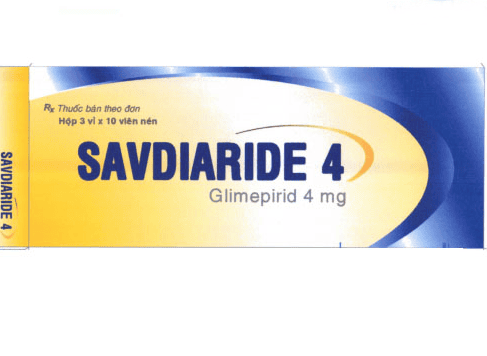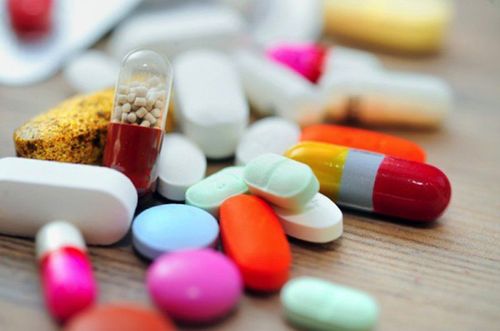This is an automatically translated article.
Glucophage 750mg is a medicine to treat type 2 diabetes in adults, especially those who have difficulty controlling blood sugar levels. Before using the drug, the patient should carefully read the instructions for use and follow the dosage recommended by the doctor.
1. What is Glucophage 750mg?
Glucophage 750mg is a drug indicated for the treatment of type 2 diabetes, especially in patients who are overweight, whose diet and exercise regimen is not effective in controlling blood sugar. Glucophage 750mg drug has the main ingredient is Metformin hydrochloride, manufactured by Merck Sante S.A.S (France).Patients with type 2 diabetes can use Mlucophage 750mg alone or in combination with other diabetes medications such as Sulfonylurea and Insulin. The drug is prepared in the form of extended-release tablets, with packaging specifications of 2 blisters x 15 tablets. Each glucophage tablet will contain the following ingredients:
Metformin Hydrochloride: The corresponding content is 750mg; Hypromellose (Hydroxypropyl methylcellulose 2208), sodium carmellose (Sodium carboxymethylcellulose) and magnesium stearate one tablet.
2. Indications and uses of Glucophage 750mg
2.1. Indications for use of Gluconate 750 xr Glucophage 750mg is usually indicated for use in the following cases:
Use the drug in combination with exercise and diet to treat the symptoms of the disease. patients with type 2 diabetes; Use in combination with Insulin or Sulfonylurea to effectively control and improve blood sugar; Treatment of patients at high risk for complications of type 2 diabetes. 2.2. Uses of Glucophage 750mg *Pharmacodynamics
Metformin in Glucophage 750mg is a biguanide, which has the role of anti-hyperglycemia and lowers basal and postprandial plasma glucose levels. Metformin does not cause hypoglycemia in people without diabetes because it does not stimulate insulin secretion. According to research, the mechanism of action of metformin usually includes 3 ways:
Inhibiting gluconeogenesis, helping to break down glycogen, thereby reducing the process of glucose generation in the liver; Increases insulin sensitivity in muscle, which improves peripheral glucose utilization; Slows down the absorption of glucose in the intestinal tract. On the other hand, Metformin can act on glycogen synthase, thereby helping to stimulate glycogen synthesis in cells. This component also contributes to increased membrane glucose transport (GLUT).
In addition to the treatment of diabetes, Metformin also plays an important role in lipid metabolism. Several clinical studies have shown that, at therapeutic doses, Metformin has the effect of lowering total cholesterol, LDL cholesterol and triglyceride levels.
UKPDS study results demonstrated long-term glycemic control in obese subjects with type 2 diabetes treated with Metformin immediate-release (applied after an erratic diet). failure), specifically:
Reduce the absolute risk of complications from type 2 diabetes: Metformin group (29.8 cases / 1000 patients - year), diet group (43.3 cases / 1000 patients) multiply - year); Reduced mortality related to type 2 diabetes: Metformin group (7.5 cases/1000 patient-years), diet group (12.7 cases/1000 patient-years); Reduced overall mortality related to type 2 diabetes: Metformin group (13.5 cases/1000 patient-years), diet group (20.6 cases/1000 patient-years); Reducing the absolute risk of myocardial infarction complications: The group of patients taking Metformin (11 cases / 1000 patients - years), the diet group (18 cases / 1000 patients - years). *Pharmacokinetics
Following oral administration of a 750 mg dose of Glucophage, peak plasma concentrations of Metformin averaged 5 hours, within 4-12 hours, equivalent to 1193 ng/mL. Through the index of AUC and Cmax in healthy people in the state of fasting and fullness, Glucophage 750 xr is bioequivalent to glucophage 500 xr, dose 1500mg.
Similar to immediate-release tablets, in the steady-state phase, AUC and Cmax tend to increase non-linearly with dose. After taking Metformin extended-release tablet at a dose of 2000mg, the observed AUC was similar to that of Metformin 100mg immediate-release tablet, taken twice a day.
When taking a dose of Glucophage 750mg in the fasted state, the AUC index decreased by 30%, but did not affect Tmax and Cmax. From the extended-release formulation, the average absorption of metformin is almost unchanged by the food composition. In addition, after repeated doses of metformin up to 2000 mg, no benefit was observed.
Metformin is very poorly bound to plasma proteins, tends to divide in red blood cells. Peak concentrations of Metformin in blood are usually lower than in plasma when occurring at approximately equal intervals. The mean volume of distribution of Metformin ranged from 63 to 2761 (Vd). The Metformin component of Glucophage 750mg is excreted unchanged in the urine. Metformin has a clearance greater than 400 mL/min, which indicates that this active substance is eliminated from the body through filtration - secretion in the glomeruli and renal tubules. Following oral administration of Glucophage 750 XR, the visible half-life of the drug was within 6.5 hours.
For diabetic patients with impaired renal function, renal clearance will decrease in proportion to creatinine. This may increase the half-life and plasma concentrations of the active substance Metformin.
3. Dosage and how to use Glucophage 750mg
3.1. Dosage of Glucophage 750mg For adults with healthy renal function:
Monotherapy or in combination with other antidiabetic agents: Glucophage 750mg is indicated for maintenance treatment of patients with type diabetes mellitus. 2 are taking immediate or extended-release metformin. The dose of Glucophage 750mg can be equal to the daily oral dose of Metformin, up to a maximum of 1500mg, taken after dinner. After about 10-15 days of taking the drug, the patient should measure the blood sugar to check the dosage compatibility of glucophage 750 xr. Use in combination with insulin: For patients already treated for type 2 diabetes with Metformin in combination with Insulin, the dose of Glucophage 750mg may be equivalent to the daily dose of Metformin, up to 1500mg taken with the evening meal. However, insulin dosage can be adjusted through the measured glycemic index. For patients with type 2 diabetes with renal failure:
Prior to initiation of Metformin therapy, renal function should be assessed. If the eGFR level is between 60 – 89 mL/min/1.73 m2; Dosage reduction may be considered depending on the degree of decline in renal function. Diabetics with kidney failure with eGFR levels between 30 and 59 mL/min/1.73 m2 can use metformin. Unless there are signs that increase the risk of lactic acidosis, the patient can adjust the dose as follows: The starting dose is 500mg ampoules / time / day.; The maximum dose is 1000mg/time/day. Patients with eGFR levels less than 30 mL/min/1m73 m2 should not use metformin. For the elderly:
Older adults with type 2 diabetes are at increased risk of renal function decline, therefore the oral dose of Glucophage 750 can be adjusted as directed by the physician based on an assessment of renal function. . For children:
Glucophage 750mg is not recommended for children. Note: Patients should start using Glucophage 750mg at a low dose, then gradually increase it to determine the minimum dose sufficient to control blood sugar and reduce side effects on the stomach.
3.2. How to use Glucophage 750mg Patients can take Glucophage according to the dose prescribed by the doctor based on the results of the blood sugar test. Patients should take the drug with water, avoiding chewing or breaking the tablet. The drug should be taken with or after dinner to avoid unpleasant gastrointestinal symptoms.
Ideally, people who are treating diabetes with Glucophage 750 XR should take it daily, avoiding intermittent use and taking more than the prescribed dose. In addition, in order to improve the effectiveness of treatment and control blood sugar well, diabetics should use drugs in combination with building a scientific diet. For patients who want to stop treatment or have unusual symptoms after taking the drug, it is necessary to report to the doctor for a suitable solution.
4. What to do when taking an overdose or forgetting a dose of Glucophage 750mg?
How to handle when taking an overdose of Glucophage 750mg:
Although there are no signs of hypoglycemia when taking Metformin up to 85g, it can lead to lactic acidosis. This is a medical emergency and the most effective method of removing Metformin and lactate is hemodialysis. How to handle when you miss a dose of Glucophage 750mg:
In case you miss a dose, the patient should take it as soon as possible as soon as he remembers. However, if the time interval between the next dose is too close, it is best to skip the missed dose and take your next dose at your usual dosing schedule. Avoid using a double dose because it can easily lead to an overdose.
5. Contraindications to the use of Glucophage 750mg
Glucophage 750mg is not used for the following subjects:
Patients who are allergic to Metformin or are sensitive to any other active ingredients/excipients in the drug; People with acute metabolic acidosis; People with diabetic pre-coma; People with severe renal failure, glomerular filtration rate less than 30 mL/min/1.73 m2; Acute conditions that may alter kidney function, including shock, severe infection or dehydration; People at risk of tissue hypoxia, especially those with acute disease or complications of chronic disease, such as respiratory failure, decompensated heart failure, shock, myocardial infarction; Women who are breastfeeding; People with alcoholism, acute alcohol intoxication or liver failure.
6. Undesirable side effects of Glucophage 750mg
During the treatment of type 2 diabetes with Glucophage 750 XR, patients may experience unwanted side effects such as:
*Common side effects:
Rash or hives on the skin , prone to irritation; Nausea, vomiting, diarrhea, loss of appetite, constipation, epigastric fullness, heartburn; Decreased levels of vitamin B12; Taste disorder. *Uncommon side effects:
Aplastic anemia, blood dysplasia, marrow failure, hemolytic anemia, agranulocytosis, thrombocytopenia; Lactic acidosis; Upper respiratory tract infection. Patients need to notify their doctor soon or immediately go to the nearest local medical facility when they realize they have the above undesirable reactions for timely support.
7. What drugs interact with Glucophage 750mg?
Glucophage 750mg may interact with some of the following drugs or other substances:
Alcohol: Taking Glucophage 750mg with alcohol may increase the risk of lactic acidosis, especially in cases of liver failure, malnutrition. or fasting; Intravenous iodinated contrast media: Increases the risk of renal failure, leading to Metformin accumulation and lactic acidosis; Diuretics: When loop diuretics are used together with Glucophage may increase the possibility of renal failure and lactic acidosis; ACE inhibitors: Leads to excessive lowering of blood sugar; The drug has intrinsic hypoglycemic activity and sympathomimetic activity, which may reduce the hypoglycemic effect of Metformin. In order to avoid adverse interactions that affect the therapeutic effect of Glucophage 750mg, patients need to inform their doctor about the list of drugs that they are currently taking.
8. Precautions and how to store Glucophage 750mg
Pregnant women and nursing mothers should not use Glucophage because it can affect pregnancy as well as the health of the newborn. For people with a work nature that requires intense concentration, such as driving or operating machinery, caution should be exercised when using this drug because it can cause excessive hypoglycemia.
Medicines should be stored in a cool, dry place with suitable humidity. Avoid storing the medicine in a place with high humidity or temperature > 30 degrees Celsius. You also need to store the medicine in an area away from direct sunlight.
Before using the medicine, you need to check the expiry date as well as the information on the product packaging. If the drug is found to be moldy, deformed or watery, the patient must absolutely not use it and should immediately discard it.
Please dial HOTLINE for more information or register for an appointment HERE. Download MyVinmec app to make appointments faster and to manage your bookings easily.













